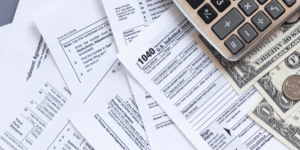Important Tax Advice for Australians: The Risks of Rushing Your Tax Return
As we approach the 2024 tax season, Australian taxpayers once again face the task of filing their tax returns.
While it’s tempting to submit your return as soon as possible, tax professionals strongly advise against rushing the process.
Taking a more thoughtful and careful approach not only helps prevent costly mistakes but also ensures a smoother experience overall.
Though some might think that filing early will give them a head start, rushing through your tax return can actually have serious consequences.
Here’s why it’s worth taking the time to prepare thoroughly, and why sometimes, a little patience can go a long way.
The Danger of Missing Deductions
One common issue when taxpayers hurry to submit their returns is the risk of overlooking key deductions and credits.
The Australian Taxation Office (ATO) offers multiple opportunities for reducing taxable income through deductions for work-related expenses, charitable donations, medical costs, and more.
However, when people rush their filings, they often miss out on these deductions or end up claiming ones they aren’t eligible for.
For instance, the ATO typically pre-fills tax return data based on reports from employers, banks, and other institutions. But when you file too early, this pre-filled data may not be fully updated, meaning you might miss some deductions.
Waiting until all the information has been received and processed allows you to catch any missing data and claim everything you’re entitled to, including income from freelance work, investments, or government support.
Additionally, if health insurance details aren’t available at the start of July, you could miss out on potential rebates or discounts.
Ultimately, filing in haste can lead to incomplete or inaccurate returns, requiring amendments later on. These corrections can delay your refund and lead to unnecessary frustration.
The Pitfalls of Filing Too Early: Expert Insights
The Australian Taxation Office (ATO) regularly advises against submitting your tax return too early, as it can lead to a variety of issues.
Rob Thomson, an assistant commissioner at the ATO, emphasizes that “tax time is not a race.” His message is straightforward: filing your return too soon increases the likelihood of errors, which often result in the need for amendments, delays in processing, and confusion.
This issue becomes especially significant because, when tax returns are lodged early, crucial financial data—such as employment income, bank interest, or dividend payments—may not have been pre-filled in the ATO system yet.
These updates are often dependent on the timely submission of reports from employers, financial institutions, and other relevant parties.
If you submit your return before this data has been fully integrated into the system, you risk overlooking income sources or making other preventable errors that could complicate your tax filing.
For instance, information regarding government benefits, private health insurance, or additional sources of income may not be included in the initial pre-filled data.
Although these oversights might appear minor at first, they can snowball into larger issues.
Missing or incorrect information could require you to make follow-up amendments to your return, which would delay your refund and add unnecessary complications to the process.
In some cases, failing to include all your income could even trigger an audit, adding further stress and uncertainty to your tax filing experience.
Additionally, rushing your submission increases the risk of making mistakes that could be easily avoided by waiting for all the data to be properly updated.
Taking the time to ensure that all your information is accurate and complete before filing helps to reduce the chances of errors and ultimately results in a smoother, faster, and more efficient tax process.

The Advantages of Automated Data: Ensuring Accurate Returns
The ATO typically starts receiving automatic updates from employers, health insurers, and financial institutions around late July.
This data is crucial for ensuring the accuracy of your tax return.
By waiting a few weeks before filing, you allow the ATO to pre-fill your information, which can make the process smoother and more precise.
With the ATO’s pre-fill system, information from your employer’s payroll and other financial entities is pulled directly into your tax return. This minimizes the chances of discrepancies between what you report and what the ATO has on file.
You can also verify this data, making sure all income, tax withheld, and deductions are correct.
If something seems off, you have time to fix it before submitting your return. By giving yourself extra time to wait for this data, you reduce the risk of errors that could lead to penalties or delays.
While the temptation to lodge quickly may seem appealing, the accuracy provided by waiting for pre-filled data can save you time and stress in the long run.
Why Patience Is Key for Accuracy
Though filing early might seem like an advantage, the truth is that the ATO’s pre-fill service is not instant.
The data from employers, health funds, and other institutions is generally not available until late July, so submitting your return early can result in incomplete or inaccurate filings.
This is especially true for those with multiple income streams, freelance or contract work, or claims for private health insurance rebates or medical expenses.
Experts like Gavan Ord from CPA Australia recommend waiting until the ATO has fully pre-filled the necessary data.
Submitting before the system is fully updated can cause taxpayers to miss important deductions, ultimately leading to the need for amendments.
This can also create a false sense of security, as many believe filing early guarantees a quicker refund. However, a complete and accurate return is much more likely to be processed quickly and without delay.
How Timing Affects Your Refund
A common misconception is that filing early guarantees a faster refund.
While early submission can expedite the process, filing too soon could cause delays if errors or missing information require corrections.
If the ATO identifies discrepancies in your return, they may request additional documents or even require a resubmission, which can significantly slow down your refund.
Waiting until all necessary data is pre-filled can actually streamline the process and ensure that your return is accurate from the start.
This cautious approach increases your chances of receiving a quicker refund without complications.
Smart Preparation for Tax Season
Rather than rushing your tax return, take the time to prepare effectively.
Preparation ensures a smoother process and helps you take advantage of every deduction and credit available.
Here are some strategies to get ready:
| 🔑 Estratégia | 💡 Dica |
|---|---|
| 📂 Organize Seus Documentos | Reúna todos os recibos, extratos e resumos necessários com antecedência. |
| 📅 Verifique Seus Dados | Certifique-se de que suas informações pessoais e financeiras estejam atualizadas no ATO (Australian Taxation Office). |
| 🌐 Use os Recursos Disponíveis | Visite o site do ATO para obter guias sobre deduções e créditos que se aplicam à sua situação. |
Final Advice: Why Patience Pays Off
Rob Thomson emphasizes that patience is essential for successful tax filing.
Taking a little extra time to carefully review your information will help you avoid mistakes and maximize your eligible deductions.
By waiting for the pre-fill process to complete, you can submit your tax return with confidence, knowing that it’s as accurate as possible.
Conclusion: The Cost of Rushing Your Tax Return
While the desire to file your tax return as early as possible is understandable, rushing through the process can result in mistakes that end up costing you both time and money.
Taking the time to ensure that all necessary information is updated and that your return is thorough and accurate can help you avoid unnecessary delays, maximize your deductions, and reduce the risk of errors that might otherwise require costly corrections.
In the grand scheme of things, it’s not about being the first to submit your tax return, but about getting it right the first time.
By approaching your tax season with patience and careful attention, you give yourself the best chance of filing an accurate return, which in turn will save you from the stress and complications of having to make amendments later on.
The process of waiting for your information to be pre-filled may seem like a delay, but it’s actually a strategy for ensuring the completeness of your return and minimizing the potential for errors that could lead to audits or other issues.
Moreover, taking a thoughtful approach means you can fully benefit from all available tax-saving opportunities. Rushing your return in the hope of a faster refund may backfire if you miss out on key deductions or overlook critical details.
While it’s tempting to file as soon as possible, the true advantage lies in allowing yourself the time to cross-check and verify your information thoroughly.
In the end, a little patience and extra attention to detail can go a long way in ensuring your tax filing process is efficient, accurate, and free of complications. By giving yourself the time to ensure everything is in order, you can not only avoid unnecessary headaches but also optimize your chances of a swift and smooth tax season.






